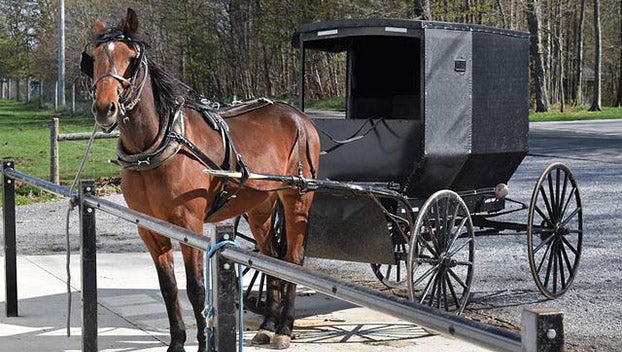Authority Effort Eyed
Published 5:08 pm Tuesday, July 26, 2011
PRINCE EDWARD – County and Town of Farmville officials are taking a serious look at establishing a water authority and parting with separate plans to address water needs. Whether it will flow smoothly or not is still to be determined, but the two localities are making progress.
Part of the consideration is evaluation of the Town and County utility infrastructure and financial review. County Administrator Wade Bartlett presented an update on the effort at the Board's July 12 meeting and cited in a memo that both are continuing and are expected to be completed around the middle of August.
“Once these items are complete the financial advisors will have the information necessary to determine the financial viability of the plan of finance and approach the credit markets to provide the required financing,” the memo cited.
It was also noted that a contract is also being developed to specify the relationship between the Town, County and Authority.
There have been some areas that the public is confused about, Bartlett cited. He noted that the plan is that the debt will be structured so as not to require any rate or tax increases.
“That's always been the plan,” he said.
Other main points cited in the memo to the board: Town Manager Gerald Spates would serve as the general manager of the authority, Bartlett would be the finance director of the authority; the town workforce would remain employees of the town and the authority will be charged labor expenses based on the amount of time Town workers perform work for the authority; the Town will perform billing and collection tasks for the authority; and the eventual goal is to have citizen appointees to serve as board members of the authority.
Bartlett emphasized that it's going to take months to work through all the details. He noted that the engineering firm is still doing the cost evaluations of the system.
Farmville District (701) Supervisor Jim Wilck offered that he is “excited” about working with the Town and Authority.
“I get a lot of questions from people who are a little bit confused that if we're getting into this, why are we still holding the interim contract – the other contract with Crowder – sort of in abeyance,” Wilck commented. “Why don't we eliminate that?”
Wilck would, specifically, make a motion that they cease their PPEA involvement with the interim agreement and not enter into a second contract with Crowder.
Under the PPEA, or Public Private Education Facilities and Infrastructure Act of 2002, localities may receive unsolicited proposals from private firms – and supervisors agreed to consider the proposal, agreeing to look at the specifics of a possible water project using the Sandy River Reservoir as outlined in an interim agreement with the submitting firm. The studied project factors the construction of an intake, water treatment facility and service lines extending to serve an area south of Farmville to Hampden-Sydney and east to Crewe. The intake structure factors an eight million gallons (MGD) per day intake infrastructure capacity and there would be an easily expandable two MGD facility treatment facility (located about a half mile from the reservoir) that could be upgraded to four MGD. The final estimate for the project presented to the board – factoring Crewe and Burkeville's participation – earlier this year stood at $24,879,000, though there were also estimated project indirect costs of $841,900.
Still, the County has not moved forward with construction of the water project and has been working with the Town on a plan where both localities would look to an Authority to provide public water services.
“We do expect that all the deliverables in the interim contract be met and all work delivered to us and pro-rata rebates made on all deliverables not met. The board alone should determine what's been met,” Wilck said.
The board, after some discussion, defeated Wilck's motion 5-2 (Wilck was joined by Prospect Supervisor Howard “Pete” Campbell) with Leigh District Supervisor Don Gantt abstaining.
“I think you just want to get it out of the back of your mind and everybody else's,” commented Board Chairman William “Buckie” Fore. “But then, too, there's a part of that contract that we need that cannot be delivered until the fall of the year…”
Wilck would offer to let them make the deliverables-and if that takes two, three four months or whatever “that's fine,” but deliver those things in the interim contract. If there's something that is not delivered, to give a pro-rata rebate.
“But, yeah, finish it,” Wilck said. “I don't care about the time on it, but let's…make it obvious that we're not getting into a permanent contract.”
Bartlett said he believed the only deliverable they haven't received is a water test required by the health department and that they would have to wait. (It has to be done in the summer.)
“And that's gonna be about $10,000 which will leave about $125,000 that we're not gonna pay at all with change orders…,” Bartlett said.
Farmville District (801) Supervisor Mattie Wiley offered during the discussion that they don't know that they're not going to go forward.
She said they would have to wait to make sure that “this is the route that (we are) taking” and offered that “right now I don't have enough information to sit here and vote to cut them off not knowing some of the finer details.”
Wilck would note, “The situation is we have no customers, let's cut it off.”
Still, it was noted the study (on the water) would cost about $10,000, which Lockett District Supervisor Robert “Bobby” Jones said they would want to have that anyhow.
Board Vice Chairman Howard Simpson would assess after the vote that some citizens are confused that they are going to take money they were going to put into the treatment plant at the Sandy River Reservoir and pay the Town for their system for the Authority.
“…We're not paying for anything,” Simpson emphasized. “The Authority (is going to) take the system over and that it will be paid for by monies that's collected from the system that they take over.”
The money, he emphasized, is not coming from the County to buy the system from the Town.





